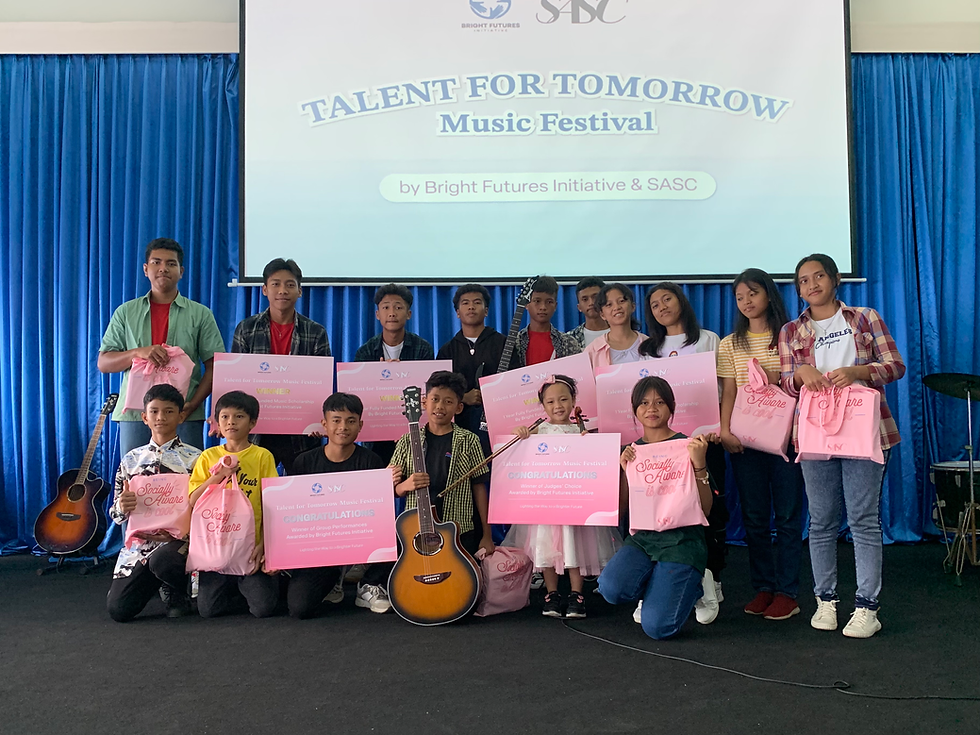
Talent for Tomorrow music FESTIVAL
The Talent for Tomorrow Music Festival, under the Bright Futures Initiative, is a powerful platform using music to combat modern slavery by empowering individuals through skills development. This festival is more than just a competition—it’s a movement. We believe that equipping people with creative skills, like music, provides a pathway to freedom, independence, and a brighter future.
Working with the Asih Lestari orphanage, a music-focused orphanage, 7 groups of up to 5 students are chosen to showcase their talent live at the music festival, supported by the sponsor SASC. They are allowed to use the following instruments to compete in this music festival: vocals, keyboard, angklung, guitar. Judged by the criteria attached below, the winning group will recieve a scholarship for a years worth of formal study at the music academy located closest to their orphanage. The other participants will enjoy donations given to the orphanage as a result of this event, which includes but is not limited to: instruments including a violin.
Date: July 20th
Dress Code: Batik
MC: Darren Liu, Translators: Moreno and Valentino
Event Details:
10:00-10:20 - Opening speech by BFI Founders
10:20-10:30 - Speech by Sponser: Founder of SASC, Priscilla Pangemanan
10:30-10:40 - Speech by Asih Lestari Orphanage
10:40-11:00 - Opening performance by all the children at Asih Lestari Orphanage
11:00-11:15 - Performance Group 1
11:15-11:30 - Performance Group 2
11:30-11:45 - Performance Group 3
11:45-12:00 - Performance Group 4
12:00-12:45 - Lunch Break
12:45-13:00 - Performance Group 5
13:00-13:15 - Performance Group 6
13:15-13:30 - Performance Group 7
13:30-13:45 - Deliberation of Judges
13:45-14:00 - Award Ceremony and Closing
Music Festival/Competition Judging Criteria:
(Group Performance – Vocals, Keyboard, Angklung, Guitar)
1. Musical Skill & Technique (20%)
-
Precision & Mastery – How well each member plays their instrument (intonation, rhythm, chord accuracy).
-
Vocal Ability (if applicable) – Pitch control, breath support, and clarity.
-
Angklung Coordination – Synchronicity in shaking rhythms (since angklung is a collaborative instrument).
-
Harmony & Blending – How well the instruments and voices complement each other.
2. Creativity & Arrangement (20%)
-
Originality – Unique interpretation of the song (e.g., new harmonies, instrumental solos).
-
Dynamic Variation – Use of volume, tempo, and emotion to keep the performance engaging.
-
Instrumental Balance – Does the arrangement highlight each instrument effectively?
3. Stage Presence & Performance (20%)
-
Confidence & Energy – Do the performers engage the audience?
-
Team Coordination – Smooth transitions, eye contact, and group chemistry.
-
Expression & Emotion – Does the performance tell a story or evoke feelings?
4. Difficulty & Challenge (20%)
-
Complexity of Piece – Did the group attempt a technically demanding song?
-
Skill Level vs. Execution – Were they ambitious while maintaining control?
5. Audience Impact & Message (20%)
-
Memorability – Does the performance leave a lasting impression?
-
Theme/Storytelling – Does the song choice or performance reflect resilience, hope, or a meaningful message?
By turning artistry into activism, we’re raising awareness while creating real change—one note at a time. Join us as we light the way to a brighter future!







